Finding Parity: Canadian Opinions About Women in Politics
March 6, 2017
In partnership with Equal Voice and in recognition of International Women’s Day and Equal Voice’s Daughters of the Vote initiative, we conducted a national survey of over 2,100 Canadian adults and asked them a range of questions about their views and perceptions about women in politics.
Here are the top 5 findings from the study:
1. We still have some work to do raising the issue of underrepresentation of women in Parliament. 58% of Canadians think there are too many or the right number of women in Canadian politics, even though, on average, Canadians estimate that women occupy 31% of the seats in the House of Commons.
2. Most don’t believe gender parity will be achieved any time soon. Almost a majority of Canadians believe that it will take 18 years or longer for there to be gender parity in the House of Commons. Troubling, 25% think it will never happen. Equal Voice estimates that at the current rate, it will take 90 years before we achieve gender parity in the House of Commons.
3. Canadians have mixed views on what the biggest obstacle to electing more women to public office is. 30% think it’s fewer women run for office because of the negative, conflictual nature of politics; 28% say it’s because political parties don’t recruit enough women, while 26% point to the family obligations of women. However, we found some fascinating differences across gender and generations.
4. Few would recommend a woman they know well to run for public office and 22% would definitely not recommend a career in elected politics.
5. Women and men would focus on different issues if they ran for Parliament. When asked to identify 3 priorities their campaign would focus on if they ran for office, we found substantial differences between men and women. Women were more likely to say they would campaign on making housing more affordable, improving public healthcare, and taking action to address climate change. Men were more likely to focus on reducing public debt, cutting taxes for corporations, and spending more on public infrastructure.
THE POLITICAL GENDER GAP IN CANADA
Most Canadians do not perceive a problem when it comes to the number of women elected to public office in Canada. Overall, 54% say the right number are elected, compared with 42% who feel there are too few. 4% feel there are too many women elected to public office.
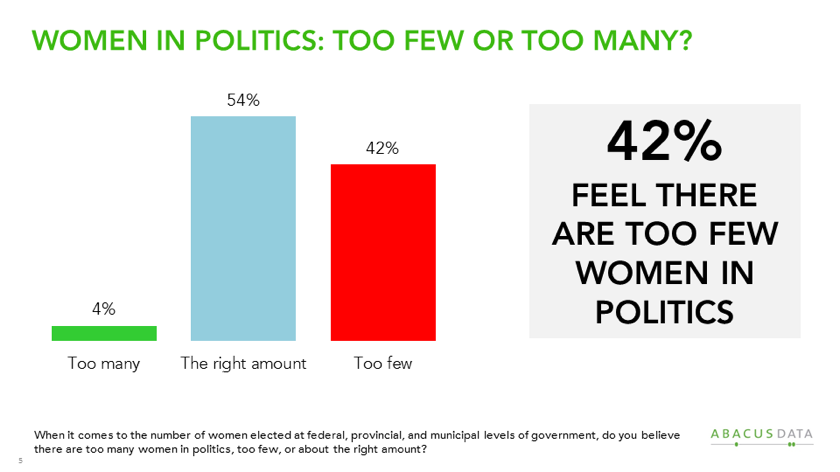
However, we found sharp differences of opinion between men and women. 51% of Canadian women feel there are too few women in politics compared with 33% of men. In particular, young women (those aged 18 to 36) believe there is a problem, as 59% feel there are not enough women elected to public office.
For the most part, Canadians have a good sense of female representation in the House of Commons, but most Canadians overestimated the percentage of female representation there. Only 13% of respondents correctly identified the percentage within 3-percentage points of the actual number (26%), while 26% underestimated the number, and 60% overestimated female representation in the house. In fact, 11% of respondents thought 50% or more of the seats in the House of Commons were represented by female MPs. Overall, the average estimate was 31% and we found no gender, age, or regional difference in the estimates.
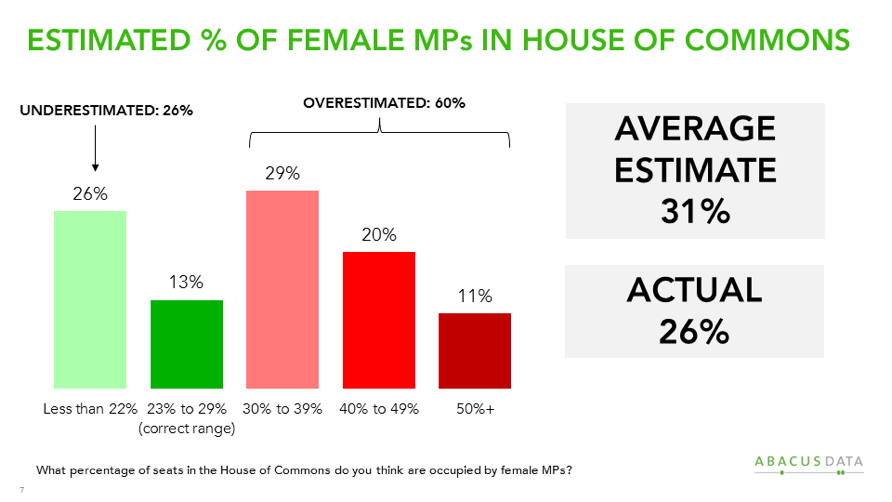
However, when we compare estimates about the percentage of women in the House of Commons with views on whether there are too many or too few women in politics, we find a strong relationship. Those who underestimate or correctly estimate the number of women in the House are more likely to feel there are too few women in politics than those who overestimate the number of women in the House. This demonstrates the importance of raising awareness of the gender gap in Canadian politics.
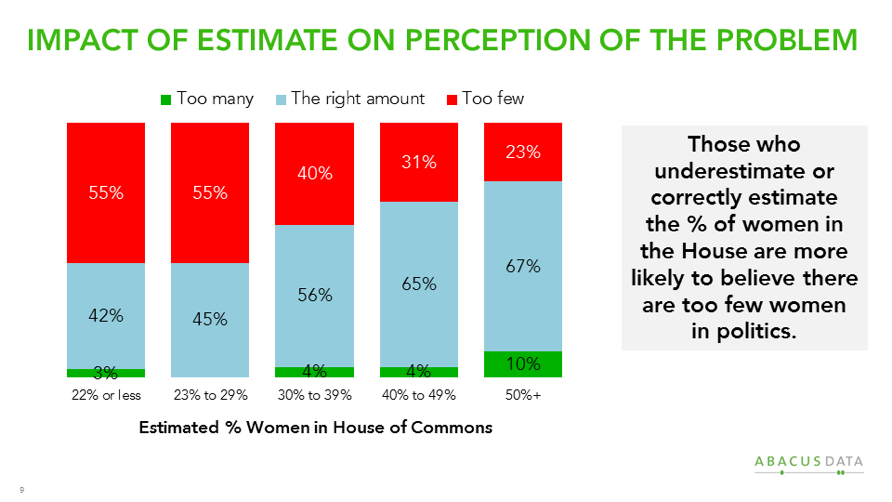
Canadians also have mixed views about when or if Canada will achieve gender parity in its elected national legislature. While 20% feel gender parity will be achieved by the 2023 federal election (6 years from now), almost a majority (46%) believe it will take at least 14 years to achieve parity, while 25% think it will never happen.
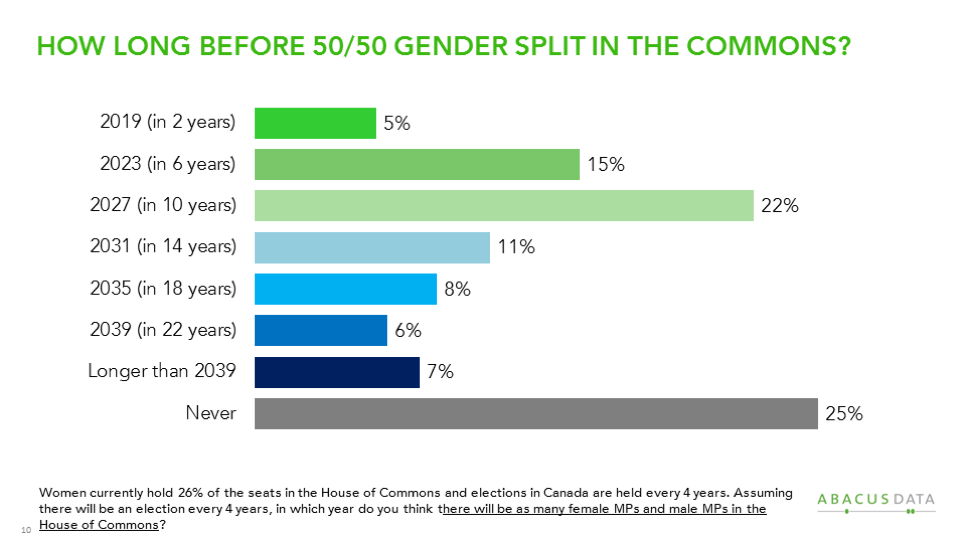
Equal Voice estimates that if current trends hold, it will take about 90 years before gender parity is reached in the House of Commons. Only 32% of Canadians recognize the challenge at hand and feel that gender parity in the House will take longer than 22 years or may never happen at all.
Interestingly, women are more likely to think it will take longer to achieve parity. In fact, Millennial men (those aged 18 to 36) are the most “optimistic” thinking it parity will be achieved much sooner than any other age/gender group.
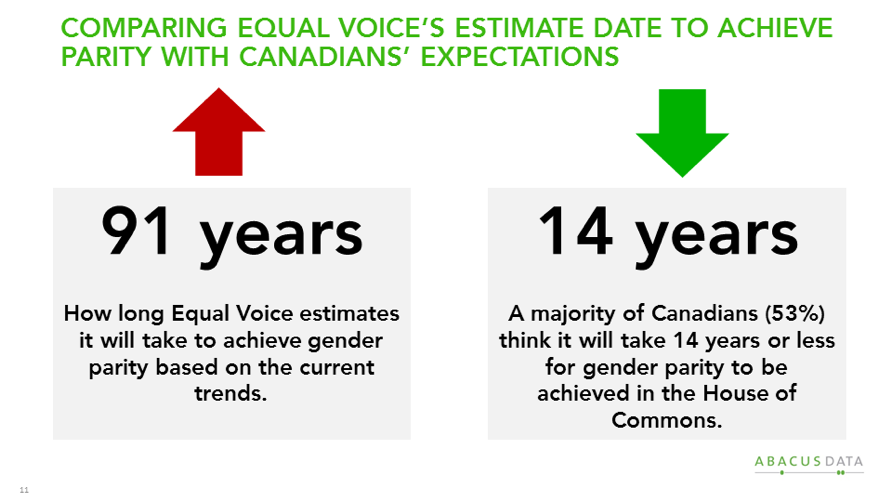
WHAT PREVENTS MORE WOMEN FROM BEING ELECTED?
There is no consensus about why women aren’t being elected to public office in Canada. When we asked what the biggest obstacle facing women entering politics was, 30% felt it was the negative nature of politics making it undesirable for women to run. 28% felt it was due to political parties failing to recruit women to run in winnable districts, while 26% felt it was because family obligations prevent women from considering a run for office. Only 12% said that voters themselves don’t support female candidates, while 5% said it was a fundraising disadvantage.

When we compare responses by women and men, women are more likely to say political parties are to blame (32%) and were less likely to mention family obligations getting in the way. Moreover, 17% of women felt that Canadians don’t want to vote for female candidates, 11-points more than male respondents.
Men, on the other hand, were more likely to say that the nature of politics and family obligations are the most significant obstacles, and were less likely to blame political parties.
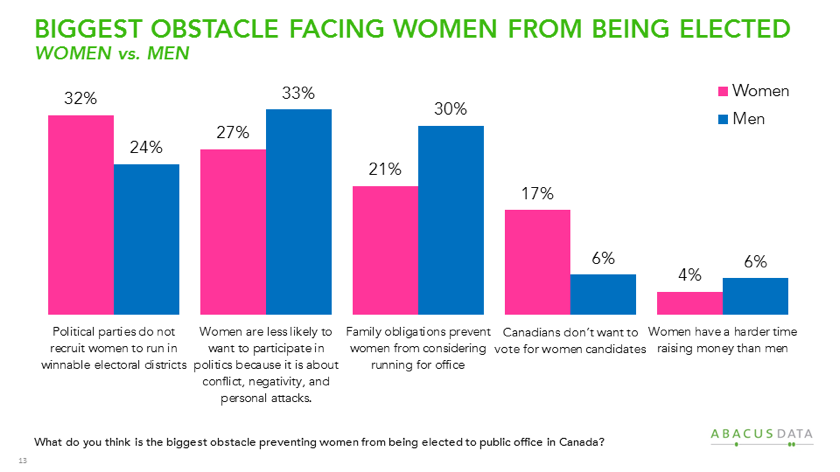
There was also a substantial difference amongst women of different generations. Millennial women were much less likely to cite family obligations as an obstacle, and more likely to reference political parties not recruiting women in winnable ridings and the nature of politics.
The same was true of men across generations. Millennial men were less likely to say that family obligations represented a hurdle for women otherwise eager to enter politics.
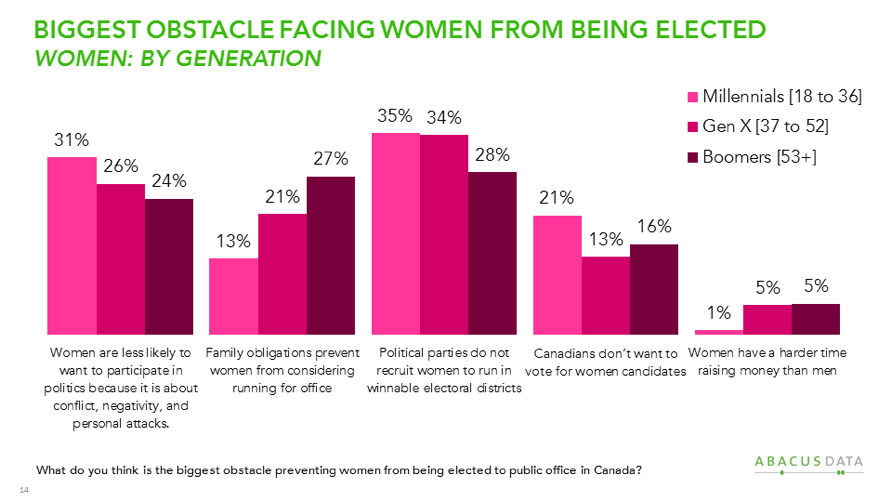
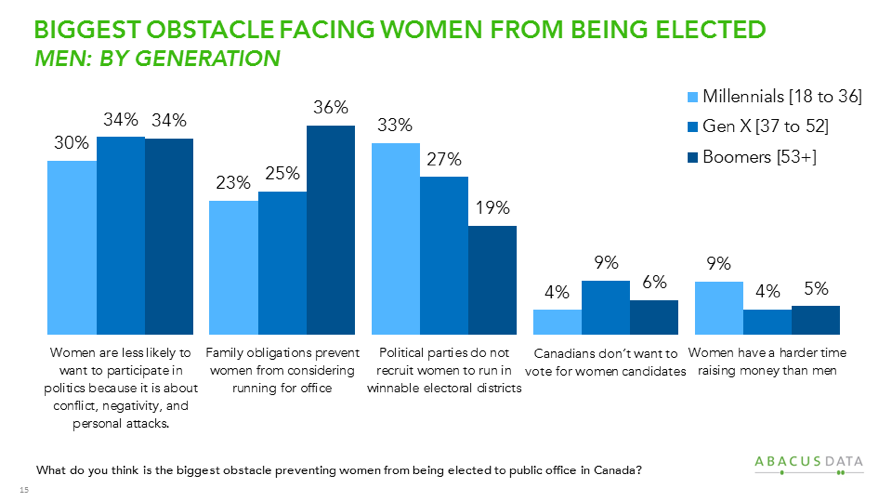
Despite the fact that many Canadians recognize that there aren’t enough women in politics, few would likely recommend a woman they know well to run for public office. Only 18% say they are very likely to recommend running for office, while another 22% say they are likely to recommend it. We find no real difference of opinion between men and women and among younger women.
We also find a relationship between what people perceive to be the biggest obstacle preventing women from running for office, and their likelihood to recommend running for public office to a woman they know well.
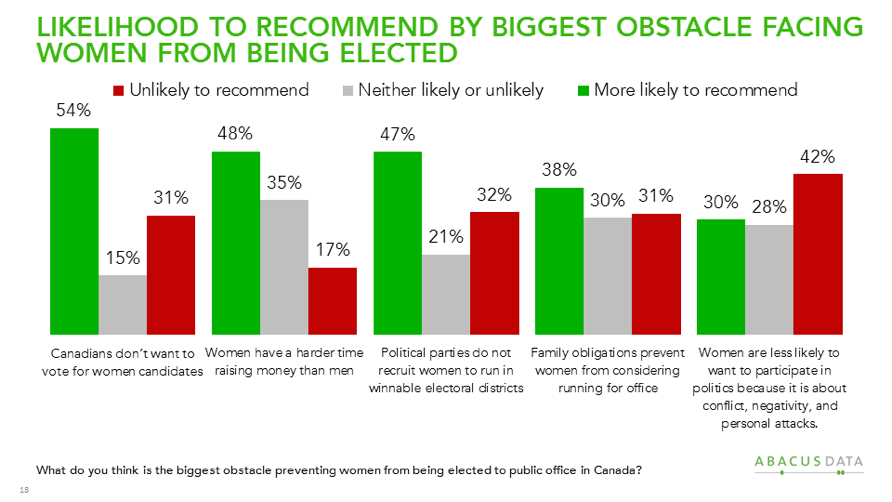
Those who say the biggest obstacles are Canadians not wanting to vote for women candidates, fundraising challenges, or political parties not recruiting enough women in winnable districts are more likely to recommend running for public office than those who think family obligations or the negativity of politics are the biggest barriers. This suggests that perceptions about the obstacles to women being elected are related to willingness to encourage women to enter politics. If you think that politics is nasty and full of conflict, you are much less likely to recommend a woman you know run for public office versus if you think the lack of parity is caused by Canadians not voting for women, women facing fundraising challenges, or political parties not doing their part to recruit women in winnable districts.
WHO ARE ROLE MODELS FOR YOUNG WOMEN TODAY?
Respondents were asked to name a female role model in politics for young women to aspire to unprompted. The word clouds below report the most commonly mentioned individuals. Those mentioned most often were Conservative Party Leader Rona Ambrose, Green Party Leader Elizabeth May, former UK PM Margaret Thatcher, former US Secretary of State Hillary Clinton, former First Lady Michelle Obama, German Chancellor Angela Merkel, and Premiers Christy Clark and Rachel Notley.
ALL RESPONDENTS
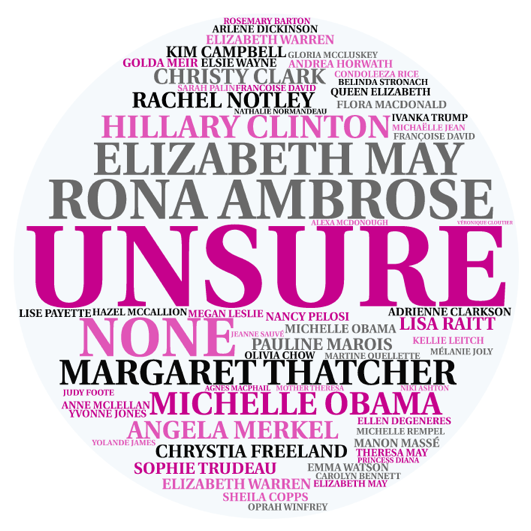
Among female respondents, Michelle Obama, Elizabeth May, Hillary Clinton, Foreign Affairs Minister Chrystia Freeland, and Rona Ambrose were mentioned more frequently.
FEMALE RESPONDENTS
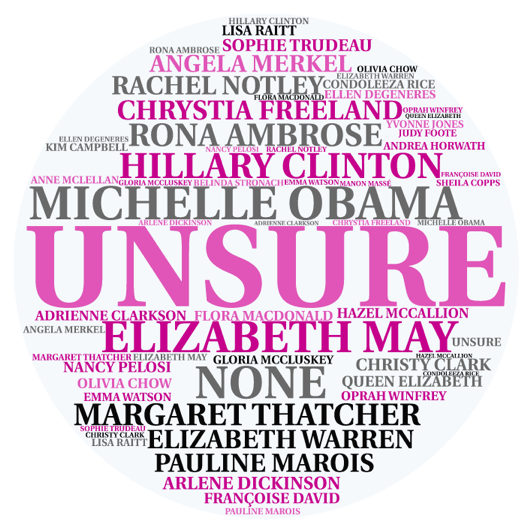
WOULD ELECTING MORE WOMEN IN PARLIAMENT CHANGE ANYTHING?
Academic research has shown that having more women in a legislature does change the focus and priorities of the legislative agenda. In our survey, we tried to assess that ourselves by asking all respondents to cho0se which three issues they would make central to their campaign if they ran for Parliament.
Overall, the top three issues selected by all respondents were improving Canada’s public healthcare system (42%), cutting taxes for middle-class Canadians (36%), and reducing public debt and the budget deficit (29%). Other highly ranked issues including increasing the number of reasonably paying jobs (22%), finding ways to make housing more affordable (22%), and reducing income inequality in Canada (21%).
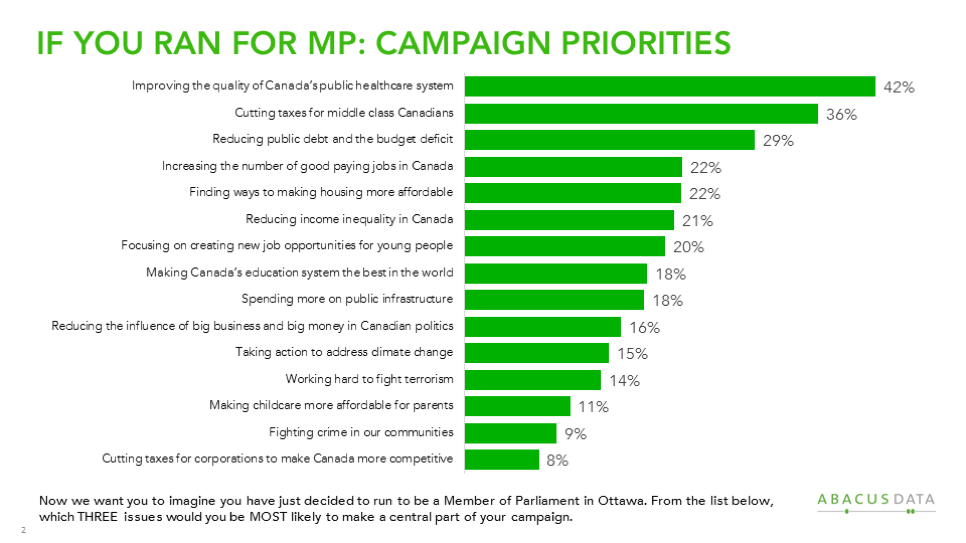
But we did find substantive differences between the issues women and men selected. Women were 9-points more likely to say they would campaign on making housing more affordable, 8-points more likely on improving the quality of healthcare, 6-points more likely on taking action to address climate change, and 5-points more likely on making childcare more affordable for parents.
In contrast, men were more likely to say their campaign would focus on reducing public debt and the budget deficit reducing public debt and the budget deficit (+9) and cutting taxes for corporations (+7).
There was no real gender difference on fighting crime, making education the best in the world, or creating new job opportunities for young people.
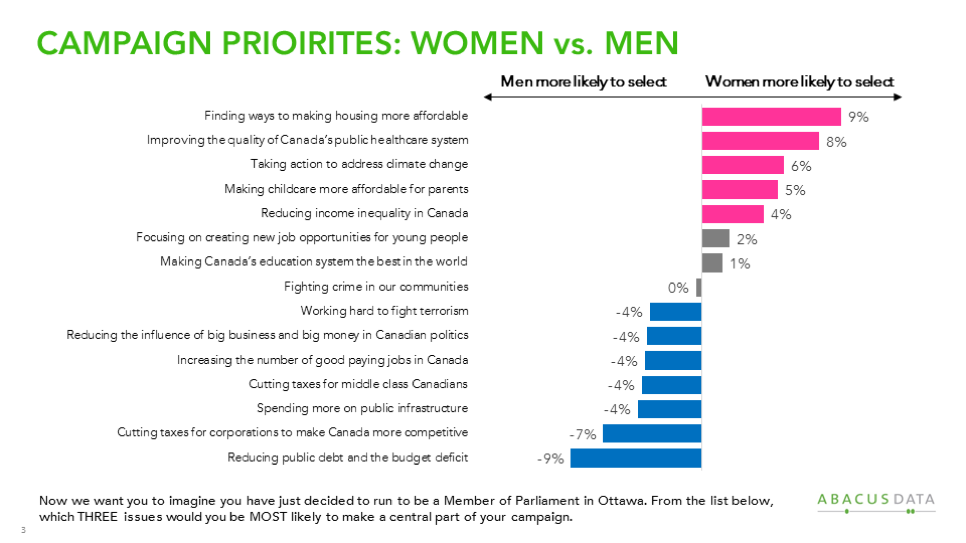
METHODOLOGY
Our survey was conducted online with 2,125 Canadians aged 18 and over from February 10 to 16, 2017. A random sample of panelists was invited to complete the survey from a large representative panel of over 500,000 Canadians.
The Marketing Research and Intelligence Association policy limits statements about margins of sampling error for most online surveys. The margin of error for a comparable probability-based random sample of 2,150 is +/- 2.2%, 19 times out of 20.
The data were weighted according to census data to ensure that the sample matched Canada’s population according to age, gender, educational attainment, and region. Totals may not add up to 100 due to rounding.
EQUAL VOICE
Equal Voice is a national, bilingual, multi-partisan organization dedicated to electing more women to all levels of political office in Canada.
Equal Voice regards the equal representation of women in Canada’s Parliament, in our provincial/territorial legislatures, and on municipal and band councils, as a fundamental question of fairness for women in terms of their access to Canada’s democratic institutions.
Founded in 2001, Equal Voice brings women and men together from across the political spectrum in its nine chapters across the country. They include chapters in: British Columbia, Alberta (south and north), Ontario (Toronto and Ottawa), Saskatchewan, three of the four Atlantic provinces (Nova Scotia, Newfoundland and Labrador, and New Brunswick), as well as a dynamic national youth chapter.
For more information, visit its website at https://www.equalvoice.ca/
ABACUS DATA INC.
We offer global research capacity with a strong focus on customer service, attention to detail and value-added insight. Our team combines the experience of our Chairman Bruce Anderson, one of Canada’s leading research executives for two decades, with the energy, creativity and research expertise of CEO David Coletto, Ph.D.
For more information, visit our website at http://www.abacusdata.ca/



